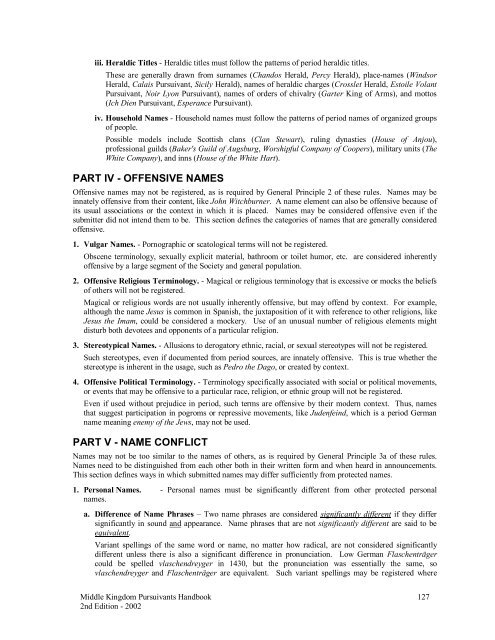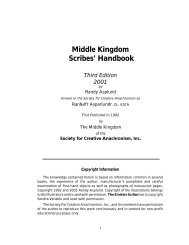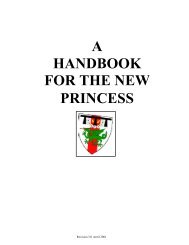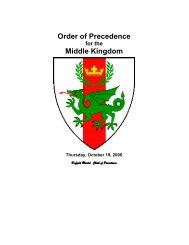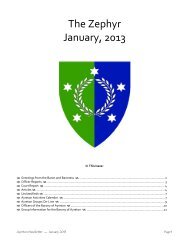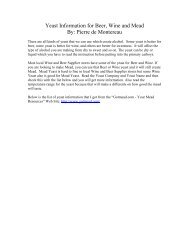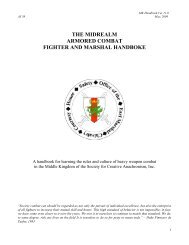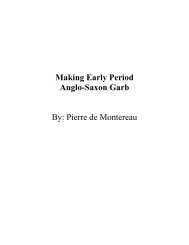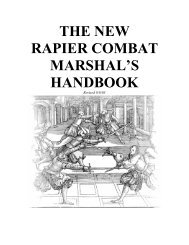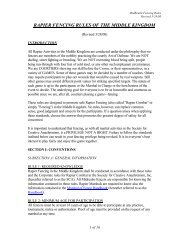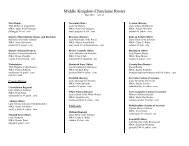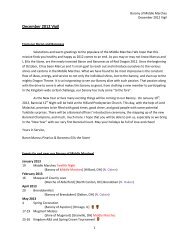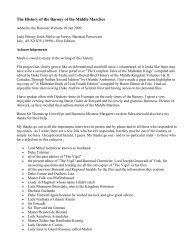earer more precisely. Most period names contained no more than three name phrases; as a rule ofthumb a personal name should not contain more than four name phrases. (A documentable exception isArabic, in which longer period names can fairly easily be found; an example is Abû `Abd AllâhMuhammad ibn Isma`îl ibn Mughîrah al-Bukhârî `Muhammad, father of `Abd Allâh, son of Isma`îl, theson of Mughîrah, the Bukharan'.)i. A byname may be one of relationship, like a patronymic or metronymic: filz Payn, Johnson,Bjarnardóttir, Guärúnarson, des langen Dietrich bruder `brother of the tall Dietrich', ingen Murchada`daughter of Murchad', Smythwyf, Mac a' Phearsain `son of the parson', abu Sa'îd `father of Sa'îd'.ii. A byname may be a second given name; in most European cultures during most of our period this is apatronymic byname: John William = John Williamson. Late in period in some cultures it may be thesecond part of a double given name: Gian Giacomo Caroldo.iii. A byname may be locative, a byname of origin or of residence: Hubert of York, Jack London,Heinrich von Hamburg, William atte Wode, Robert Undertheclyf, Matthias de Flandre; Alphonse lePicard, Dirk der Brabanter, Adam (le) Flemyng, Wautier Alleman, Herman Münstermann. Names ofresidence include sign names taken from signs on buildings: atte Belle `at the [sign of the] Bell', zurKrone `at the [sign of the] crown', zum blauen Esel `at the blue Ass'. These are extremely rare inEnglish but not uncommon in German.iv. A byname may describe occupation, status, or office: John Bowwright, Hans Schneider, Jehan (le)Changeur, Maud Webster, Nicolaus Ankersmit, William Parson, Serlo le Reve, Adam (le) Freman.v. A byname may be a descriptive nickname: Osbert le Gentil, Skalla-Björn `bald', Conrad Klein `small',Klein Conrad, Robertus cum Barba `with the beard', Ludolf metter langher nese `with the long nose',Henry Beard, Rudolfus der Esel `the Ass', Gilbert le Sour, John Skamful, Thorvaldr inn kyrri `thequiet', Iain Camshròn `hook-nose'.vi. Finally, a byname may be a sentence, oath, or phrase name: Geoffrey Likkefinger, Adam Brekeleg,Rudolfus Drinkwasser, Otto Dumernyt `Do nothing to me!', Nickl Lerenpecher `Empty the tankard',Serle Gotokirke, John Falleinthewelle, Godeke Maketwol `Make it well', Katharina Gottvergebmirs`God forgive me for it!', Richard Playndeamours `full of love', Henry ffulofloue, Petronilla Notegood,Hans mornebesser `better [in the] morning'.Some bynames may fit into more than one category: Edward Pepper may be named for his temper orfor his occupation as spice-merchant; Herbert le Knif may have a notable knife, or he may be a cutler;and Notegood, like other phrase names without verbs, can also be considered a descriptive nickname.Lion may be descriptive or an abbreviated form of atte Lyon `at the [sign of the] lion'.b. Non-Personal Names - Branch names, names of orders and awards, heraldic titles, and household namesmust consist of a designator that identifies the type of entity and at least one descriptive element.Common designators are Shire, Barony, Guild, House, Order of the, and Herald. The designator must beappropriate to the status of the submitter. Society branches may use the designator established byCorpora for their category of group or any authorized alternative form. The designator may be includedas part of a one-word name if the authorized form was used that way in period, like the English wordshire, which appears as a part of the one-word name Worcestershire.i. Branch Names - Names of branches must follow the patterns of period place-names.Some good Society examples are: Shire of Carlsby, Standonshire, Barony of Jararvellir, College ofSaint Carol on the Moor, all of which closely resemble period place-names.ii. Names of Orders and Awards - Names of orders and awards must follow the patterns of the namesof period orders and awards.These are often the names of saints; others are similar to sign names (see RfS III.2.a.iii). Someexamples are: the Order of Saint Michael, the Order of Saint Maurice and Saint Lazarus, theBrethren of the Sword, the Order of the Garter, La Toison d'Or (the Order of the Golden Fleece), theOrder of the Golden Rose, the Order of the Star, the Order of the Swan, La Orden de la Jara (theKnights of the Tankard), the Order of Lilies.126 <strong>Middle</strong> <strong>Kingdom</strong> <strong>Pursuivants</strong> <strong>Handbook</strong><strong>2nd</strong> <strong>Edition</strong> - 2002
iii. Heraldic Titles - Heraldic titles must follow the patterns of period heraldic titles.These are generally drawn from surnames (Chandos Herald, Percy Herald), place-names (WindsorHerald, Calais Pursuivant, Sicily Herald), names of heraldic charges (Crosslet Herald, Estoile VolantPursuivant, Noir Lyon Pursuivant), names of orders of chivalry (Garter King of Arms), and mottos(Ich Dien Pursuivant, Esperance Pursuivant).iv. Household Names - Household names must follow the patterns of period names of organized groupsof people.Possible models include Scottish clans (Clan Stewart), ruling dynasties (House of Anjou),professional guilds (Baker's Guild of Augsburg, Worshipful Company of Coopers), military units (TheWhite Company), and inns (House of the White Hart).PART IV - OFFENSIVE NAMESOffensive names may not be registered, as is required by General Principle 2 of these rules. Names may beinnately offensive from their content, like John Witchburner. A name element can also be offensive because ofits usual associations or the context in which it is placed. Names may be considered offensive even if thesubmitter did not intend them to be. This section defines the categories of names that are generally consideredoffensive.1. Vulgar Names. - Pornographic or scatological terms will not be registered.Obscene terminology, sexually explicit material, bathroom or toilet humor, etc. are considered inherentlyoffensive by a large segment of the Society and general population.2. Offensive Religious Terminology. - Magical or religious terminology that is excessive or mocks the beliefsof others will not be registered.Magical or religious words are not usually inherently offensive, but may offend by context. For example,although the name Jesus is common in Spanish, the juxtaposition of it with reference to other religions, likeJesus the Imam, could be considered a mockery. Use of an unusual number of religious elements mightdisturb both devotees and opponents of a particular religion.3. Stereotypical Names. - Allusions to derogatory ethnic, racial, or sexual stereotypes will not be registered.Such stereotypes, even if documented from period sources, are innately offensive. This is true whether thestereotype is inherent in the usage, such as Pedro the Dago, or created by context.4. Offensive Political Terminology. - Terminology specifically associated with social or political movements,or events that may be offensive to a particular race, religion, or ethnic group will not be registered.Even if used without prejudice in period, such terms are offensive by their modern context. Thus, namesthat suggest participation in pogroms or repressive movements, like Judenfeind, which is a period Germanname meaning enemy of the Jews, may not be used.PART V - NAME CONFLICTNames may not be too similar to the names of others, as is required by General Principle 3a of these rules.Names need to be distinguished from each other both in their written form and when heard in announcements.This section defines ways in which submitted names may differ sufficiently from protected names.1. Personal Names. - Personal names must be significantly different from other protected personalnames.a. Difference of Name Phrases – Two name phrases are considered significantly different if they differsignificantly in sound and appearance. Name phrases that are not significantly different are said to beequivalent.Variant spellings of the same word or name, no matter how radical, are not considered significantlydifferent unless there is also a significant difference in pronunciation. Low German Flaschenträgercould be spelled vlaschendreyger in 1430, but the pronunciation was essentially the same, sovlaschendreyger and Flaschenträger are equivalent. Such variant spellings may be registered where<strong>Middle</strong> <strong>Kingdom</strong> <strong>Pursuivants</strong> <strong>Handbook</strong> 127<strong>2nd</strong> <strong>Edition</strong> - 2002
- Page 2:
Middle Kingdom Pursuivants Handbook
- Page 5 and 6:
INTRODUCTION.......................
- Page 7 and 8:
Saracens: Early to Mid-Medieval Mus
- Page 9 and 10:
IntroductionOsric of FayrehopeWhat
- Page 11 and 12:
AcknowledgementsMistress Elena de V
- Page 13 and 14:
The Middle KingdomCollege of Herald
- Page 15 and 16:
Regional HeraldsConstellation Heral
- Page 17 and 18:
Pursuivant DutiesDuties of the Bran
- Page 19 and 20:
All submissions should be sent to t
- Page 21 and 22:
What to Report?First of all, your r
- Page 23 and 24:
esponsibility now. It wouldn’t hu
- Page 25 and 26:
simply too pervasive. Chilly weathe
- Page 27 and 28:
switched into the losers’ bracket
- Page 29 and 30:
prevent accusations of a rigged lis
- Page 31 and 32:
the green fabric), a larger spool o
- Page 33 and 34:
Precedence and CourtesyCourtly Beha
- Page 35 and 36:
Territorial Barons and Baronesses m
- Page 37 and 38:
c. Once all presentations appear to
- Page 39 and 40:
i. Oaths of Fealty and Acknowledgem
- Page 41 and 42:
herald is the voice of the Crown an
- Page 43 and 44:
Award of the Dragon's FlightOP Abbr
- Page 45 and 46:
Award of ArmsOP Abbreviation - AoAL
- Page 47 and 48:
Order of the Red CompanyOP Abbrevia
- Page 49 and 50:
Order of the WillowOP Abbreviation
- Page 51 and 52:
Order of the Gold MaceOP Abbreviati
- Page 53 and 54:
Master of ArmsOP Abbreviation - MSC
- Page 55 and 56:
Prince and Princess of NorthshieldO
- Page 57 and 58:
- The Consort of Northshield bears
- Page 59 and 60:
The Submission ProcessWorking with
- Page 61 and 62:
A good consultant will have these e
- Page 63 and 64:
submit it anyway (“I may be wrong
- Page 65 and 66:
Internal Letter Of Acceptance And R
- Page 67 and 68:
NamesOn Names and Name Documentatio
- Page 69 and 70:
Choosing a CultureJehan de la March
- Page 71 and 72:
Clothing: For the Slavic groups, pr
- Page 73 and 74:
Politics: The entire Islamic world
- Page 75 and 76:
Although in the earlier Middle Ages
- Page 77 and 78:
character in Household’s Arabesqu
- Page 79 and 80:
An Extremely Brief BibliographyWest
- Page 81 and 82:
ArmoryThe Philosophical Roots of He
- Page 83 and 84:
Even if your natural instinct for a
- Page 85 and 86:
5. Peripheral secondary charges.6.
- Page 87 and 88: Brisures (marks of cadency) and aug
- Page 89 and 90: Still found in mundane blazons are
- Page 91 and 92: Efficient Conflict ResearchKeridwen
- Page 93 and 94: 1. Is there a peripheral charge (a
- Page 95 and 96: checking under the old rules, the s
- Page 97 and 98: 2. Yes, the peripheral is charged.
- Page 99 and 100: Many authors state that dancetty is
- Page 101 and 102: Charges may be placed on either sid
- Page 103 and 104: It’s a bit more complicated to ke
- Page 105 and 106: This page shows properly drawn exam
- Page 107 and 108: This page shows a number of common
- Page 109 and 110: Postures of Animals (cont’d)Posit
- Page 111 and 112: Postures of BirdsPosition & Comment
- Page 113 and 114: Postures of Fish and DolphinsPositi
- Page 115 and 116: Barony of Caer Anterth MawrAzure, a
- Page 117 and 118: Barony of the North WoodsAzure, a w
- Page 119 and 120: Shire of AfonlynAzure, on a bend ar
- Page 121 and 122: Shire of Rivenwood TowerErmine, on
- Page 123 and 124: Reference BooksThe Basic HeraldBron
- Page 125 and 126: Bardsley, Charles Wareing. English
- Page 127 and 128: Kaganoff, Benzion C. A Dictionary o
- Page 129 and 130: Sims, Clifford Stanley. The Origin
- Page 131 and 132: Moncreiffe, Iain, and Don Pottinger
- Page 133 and 134: Bruce Draconarius of Mistholme and
- Page 135 and 136: Rules and RegulationsRules for Subm
- Page 137: Although China, Random and Starhawk
- Page 141 and 142: ii. Number of Name Phrases - A pers
- Page 143 and 144: PART VII - COMPATIBLE ARMORIAL CONT
- Page 145 and 146: i. A metal and a color;ii. An eleme
- Page 147 and 148: PART IX - OFFENSIVE ARMORYOffensive
- Page 149 and 150: ii. Field-Primary Armory - If neith
- Page 151 and 152: j. Changes to Charges on Charges -
- Page 153 and 154: 3. Marshalling. - Armory that appea
- Page 155 and 156: directly by individuals, but may be
- Page 157 and 158: the Laurel Office from the registra
- Page 159 and 160: charge or augmentation is transferr
- Page 161 and 162: so that ð is alphabetized as dh,
- Page 163 and 164: 1. Failure to Comment. Failure to c
- Page 165 and 166: B. Content of Letters of Acceptance
- Page 167 and 168: 1. Principal Heralds - The Principa
- Page 169 and 170: 1. Financial Reports - Financial re
- Page 171 and 172: Appendix B - Standard Designations
- Page 173 and 174: Appendix D - Suggested Standard For
- Page 175 and 176: Appendix G - Role of the Deputy Sov
- Page 177 and 178: Glossary of TermsThis glossary was
- Page 179 and 180: Complement, In Her*—Describes the
- Page 181 and 182: Fur—Some furs, like Vair, Potent
- Page 183 and 184: Mon—Japanese armorial insignia†
- Page 185 and 186: Registration—Acceptance by Laurel
- Page 187 and 188: AppendicesSources for Heraldic Publ
- Page 189 and 190:
• Send the four copies in and kee
- Page 191 and 192:
“Major” or “minor” changes?
- Page 193 and 194:
See the General section at the begi


